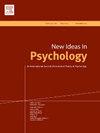Presenting a strengths-based ecological model for promoting well-being among LGBTQ+ adults
IF 2.9
3区 心理学
Q2 PSYCHOLOGY, EXPERIMENTAL
引用次数: 0
Abstract
Models of LGBTQ+ health demonstrate factors influencing mental and physical health (e.g., unique stressors due to living in a heterosexist and cissexist society). However, current models of LGBTQ+ health do not adequately organize how strengths throughout multiple ecological levels influence the well-being of LGBTQ+ individuals. In this paper, we propose and describe an ecological model of LGBTQ+ strengths impacting the specific health outcome of LGBTQ+ well-being. This model integrates and organizes literature on intersectionality and LGBTQ+ experiences, LGBTQ+ individual well-being outcomes, and LGBTQ+ strengths across ecological levels of individual, interpersonal, organizational, community, and structural. Model strengths, limitations, and applications are discussed.
提出了一个基于优势的生态模型,以促进LGBTQ+成年人的福祉
LGBTQ+健康模型展示了影响心理和身体健康的因素(例如,由于生活在异性恋和异性恋社会中而产生的独特压力源)。然而,目前的LGBTQ+健康模型并没有充分组织跨多个生态水平的优势如何影响LGBTQ+个体的健康。在本文中,我们提出并描述了LGBTQ+优势影响LGBTQ+福祉的特定健康结果的生态模型。该模型整合并组织了有关交叉性和LGBTQ+经验、LGBTQ+个人福祉结果以及LGBTQ+在个人、人际、组织、社区和结构生态层面上的优势的文献。讨论了模型的优点、局限性和应用。
本文章由计算机程序翻译,如有差异,请以英文原文为准。
求助全文
约1分钟内获得全文
求助全文
来源期刊

New Ideas in Psychology
Multiple-
CiteScore
4.80
自引率
3.80%
发文量
37
期刊介绍:
New Ideas in Psychology is a journal for theoretical psychology in its broadest sense. We are looking for new and seminal ideas, from within Psychology and from other fields that have something to bring to Psychology. We welcome presentations and criticisms of theory, of background metaphysics, and of fundamental issues of method, both empirical and conceptual. We put special emphasis on the need for informed discussion of psychological theories to be interdisciplinary. Empirical papers are accepted at New Ideas in Psychology, but only as long as they focus on conceptual issues and are theoretically creative. We are also open to comments or debate, interviews, and book reviews.
 求助内容:
求助内容: 应助结果提醒方式:
应助结果提醒方式:


